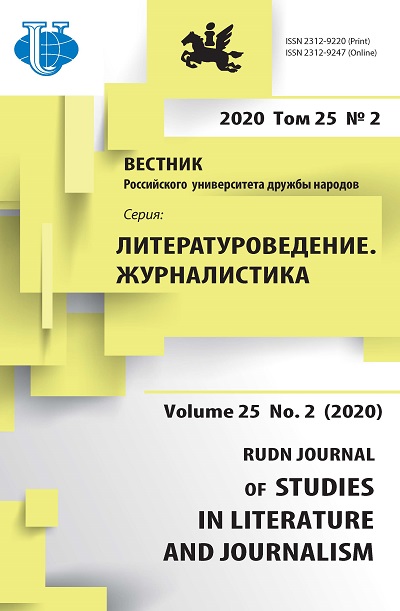The Miracle or the Monster? The problem of institutional communication supremacy in the regional TV news
- Authors: Gromova E.B.1
-
Affiliations:
- Lomonosov Moscow State University Branch in Sevastopol
- Issue: Vol 25, No 2 (2020)
- Pages: 341-350
- Section: JOURNALISM
- URL: https://journals.rudn.ru/literary-criticism/article/view/24303
- DOI: https://doi.org/10.22363/2312-9220-2020-25-2-341-350
- ID: 24303
Cite item
Full Text
Abstract
The scientific objective of the study was to show the markers of institutional communication, that express themselves in discourse shifting from the frame “information” to the frame “PR” in the news of regional TV channels. The study was conducted on the materials of the plots about construction in the news programs of four Crimea state TV channels. The analysis sampled and systematized the semantic and lexical markers of institutional communication. The article defines the dominancy of the texts with PR in the TV news plots about construction in Crimea, revealed the insecurity of this phenomenon for the journalist’s professional tasks. Such approach proposed in the article was applied for the first time. In studying the methods of researching were: discourse-analysis, content-analysis, systematization, synthesis. The study concluded the non-consent of the dramatic contradiction between the journalism and PR in the regional news programs for today.
About the authors
Ekaterina B. Gromova
Lomonosov Moscow State University Branch in Sevastopol
Author for correspondence.
Email: katya-64@inbox.ru
senior lecturer of the Department of Journalism
7 Geroev Sevastopolya St, Sevastopol, 299000, Russian FederationReferences
- Chepkina, E.V. (2000). Russkiy zhurnalistskiy diskurs: tekstoporozhdayushchie praktiki i kody (1995–2000) [Russian journalist’s discourse: text generating practices and codes (1995–2005)]. Ekaterinburg.
- Chepkina, E.V., & Enina, L.V. (2012). Diskursivnye praktiki zhurnalistiki: metod analiza [Discourse practices of journalism: the method of analysis]. Stilistika zavtrashnego dnya: sb. st. k 80-letiyu professora Grigoriya Yakovlevicha Solganika [Stylistics of tomorrow: collection of articles for the 80th anniversary of Professor Grigory Yakovlevich Solganik] (pp. 291–292). Moscow.
- Vorsobin, V. (January 13, 2020). Pochemu iz Kryma vyzhivayut rossiyskiy biznes [Why the business is driven out of Crimea]. Komsomol'skaya Pravda. Retrieved March 15, 2020 from https://www.kp.ru/daily/27077.7/4148033/
- Gavra, D.P. (2019). Rossiyskaya mediasistema – gibridnyy dvukhurovnevyy format [Russian media system – hybrid format]. Aktual'nye problema mediaissledovaniy – 2019: IX Mezhdunarodnaya nauchno-prakticheskaya konferentsiya NAMMI [Current problems of media research – 2019: IX International scientific and practical conference of NAMMI]: materials of the conference (pp. 33–34). Moscow, MGU Publ.
- Kara-Murza, S. (2015). Manipulyatsiya soznaniem. Vek XXI [Manipulation of the conscience. XXI Century]. 2nd ed., revised and expanded. Moscow, Algoritm Publ.
- Vesti. Krym [Vesti. Crimea]. (September 8, 2019). Retrieved March 15, 2020 from https://newsvideo.su/video/11413762
- Vesti. Krym [Vesti. Crimea]. (December 2, 2019). Retrieved March 15, 2020 from https://www.youtube.com/watch?v=hBzqvpxVEjc&feature=youtu.be
- Vesti. Krym [Vesti. Crimea]. (December 8, 2019). Retrieved March 12, 2020 from https://www.youtube.com/watch?v=ZIovFNUwKg4&feature=youtu.be
- Vesti. Krym [Vesti. Crimea]. (February 15, 2020). Retrieved March 15, 2020 from https://www.youtube.com/watch?v=0IFoaSvfylY&feature=youtu.be
- Oleshko, E.V. (2018). Konvergentnaya zhurnalistika: professional'naya kul'tura kak faktor optimizatsii informatsionno-kommunikativnykh protsessov [Convergent journalism: professional culture as factor of the optimization of the information-communication processes] (Dissertation of Doctor of Philology). Ekaterinburg.
- Novosti 24 [News 24]. (March 13, 2020). Retrieved March 14, 2020 from http://crimea24.tv/ content/kakie-posledstviya-stroitelstva-naberezhnoy-zhdut-zhiteley-sak
- Avtokhutdinova, O.F. (2015). “Drugoy” kak personazh v SMI: diskursivnye praktiki konstruirovaniya [The “Other” as a character in SMI: discourse practices of framing] (Dissertation of the Candidate of Philological Sciences). Ekaterinburg.
- Chto v Sevastopole proiskhodit [What is happening in Sevastopol]: Facebook group. Retrieved April 18, 2020 from https://m.facebook.com/groups/247463375277475/ permalink/3131793903511060/?d=m&s=100000847662641
- Vesti. Krym [Vesti. Crimea]. (November 24, 2019). Retrieved March 14, 2020 from https://www.youtube.com/watch?v=twGuXqz-qg4&feature=youtu.be
- TV channel “Millet”. (November 22, 2019). Information program “Khaberler”. Retrieved March 18, 2020 from https://www.youtube.com/watch?v=GF5_92nO3Ec
- Novosti 24 [News 24]. (November 23, 2019). Retrieved March 18, 2020 from https://www.youtube.com/watch?v=2ID2ImX5PSM
- Ershov, Yu.M. (2014). Provodniki spetsial'nykh interesov v SMI kak sub"ekty informatsionnoy politiki [The conductors of special interests as the subjects of information policy]. I-format. Zhurnalistika provintsii [I-format. Journalism of the province]: the anthology (issue 9). Stavropol, Dizayn-studiya B Publ.
- Markov, E.A. (2010). Vlast' i SMI v Rossii: istoriya vzaimodeystviya [Authority and mass media in Russia: the history of interaction]. Izv. Rossiyskogo gos. ped. un-ta imeni A.I. Gertsena, (123), 204–214.
- Aksenova, O.V. (2016). Aktorskaya paradigma upravleniya v epokhu peremen: adaptatsiya ili protivodeystvie [The actor’s paradigm of governance in the époque of changing: adaptation or confrontation?]. Rossiya reformiruyushchayasya [Russia is being reformed]: yearbook: collection of scientific articles (issue 14, pp. 338–339). Moscow, Novyy khronograf Publ.
Supplementary files















